Written and translated by Yu-Chung Chang
張鈺釧 文/譯 VBS 659
Pasadena College and the California Institute of Technology jointly held a Pi Day AI Conference from March 13 to 15, 2025, exploring the future of artificial intelligence from both technological and humanistic perspectives. The Dharma Realm Buddhist University (DRBU) and California State University, Los Angeles, co-sponsored this event. Professor Doug Powers, Vice President of Finance and Administration at Dharma Realm Buddhist University (DRBU), Professor Martin Verhoeven, Dean of Academics, and Megan Sweet, Director of University Relations, were invited to deliver lectures in Pasadena, California. On March 14, Professor Doug Powers and Megan Sweet gave their respective presentations titled “Humanism and the Digital Revolution” and “Buddhist Humanistic Education in Practice.” Their talks emphasized nurturing human values and awareness amid rapid technological change.
巴沙迪納學院和加州理工學院,於2025年3月13日至15日,舉行圓周率日人工智能研討會,從科技與人文的角度探討人工智能的未來。法界佛教大學(法大)和加州州大洛杉機分校為協辦單位。
法大財務行政副校長鮑果勒教授、教務長馬汀・維荷文教授與大學關係主任梅根・史惟特,都發表了專題演講。鮑果勒教授和梅根・史惟特於14日演講,兩人的主題分別是「人文主義與數位革命」、「佛教人文教育的實踐」。他們強調在快速變遷的科技時代中,培養人文價值與覺照意識的重要性。
Professor Powers began by outlining DRBU’s mission to integrate Western, Chinese Confucian-Buddhist, and Indian philosophical traditions. While AI is rapidly outpacing humans in logic and data analysis, President Powers stressed the irreplaceable uniqueness of individual human experience: “You cannot duplicate any moment of experience of any human being.” He emphasized that education must foster self-awareness and human insight to prepare students for a world increasingly shaped by AI.
Professor Powers argued that reflective learning rooted in classic texts across cultures helps students understand consciousness and meaning beyond technological function. This, he suggested, is key to preserving our humanity.
鮑果勒教授首先介紹法大融合西方、中國儒佛傳統與印度哲學的教育使命。他指出,雖然人工智能在邏輯與資料分析方面愈來愈勝過人類,但「每一個人的經驗都是無法複製的」。他強調,教育應培養學生的內在反思與人類意識,以面對AI(人工智能)主導的未來。他認為,透過研讀多元文化中的經典文本,學生得以深入探討自我意識與生命意義,這是科技無法取代的人類特質。
Meghan Sweet then introduced DRBU’s educational framework, built on three pillars: Core Texts, Embodied Pedagogy, and Service and Community. She described how students study foundational works from Buddhist, Indian, Chinese, and Western traditions. Learning at DRBU extends beyond reading—students engage in meditation, contemplative practices, and retreats to deeply experience the material.
Sweet highlighted that this embodied pedagogy integrates mind, body, and emotion, cultivating a holistic, human-centered education especially relevant in the digital age. “Students learn through the texts, not just about them,” she noted.
接著,史惟特介紹法大的教育架構,包括三大支柱:核心經典、身心教學打坐、觀照與打七等方式,親身體驗書中智慧。這種「體驗式教學法」整合理性、情感與身體的學習過程,提供一種整合式教育,回應數位時代的需要。她指出:「學生是透過經典學習,而不僅是學習關於經典的學問。」
The third pillar—Service and Community—addresses the growing problem of social isolation. Sweet cited the Surgeon General’s 2023 warning of a loneliness epidemic and explained how DRBU builds community through small class sizes, shared experiences, and debt-free access to education.
第三個支柱「服務與社群」回應當代社會日益嚴重的孤獨問題。史惟特引用2023年美國衛生署長對「孤獨流行病」的警示,並說明法大透過小班教學、共同生活與無學債教育,建立深度社群。
Returning to the stage, Professor Powers stressed the need for mindful awareness in the face of digital distraction. Without reflection and internal stillness, people risk becoming “mechanical algorithms”—reactive rather than reflective beings. DRBU, he said, strives to cultivate concentration and presence in its students, enabling them to engage more meaningfully with the world.
The session ended with a thoughtful discussion about the irreplaceable nature of human consciousness. Professor Powers reaffirmed that while AI can mimic cognition, it cannot replicate the depth of authentic human experience. The Pi Day event offered a compelling case for education rooted in wisdom, reflection, and community as essential for the digital age.
最後,鮑果勒教授再次強調在數位干擾中培養覺察與定力的重要。他指出,若缺乏反思,人可能會淪為「機械式演算法」,失去自主的內在生活。
當天活動尾聲的討論中,鮑果勒教授提醒,人工智能也許能模仿思考,但永遠無法取代人類深層的意識與經驗。圓周率日反思活動展示出以智慧、覺察與社群為本的教育,正是數位時代不可或缺的關鍵。
Professor Martin Verhoeven delivered a lecture titled “Ethical Issues and Challenges of AI” at Pasadena College on the 15th, where he critiqued the growing divide between science and humanities.
He revisited the Greek myth of Prometheus, often celebrated in tech circles as a symbol of innovation and enlightenment. “But read the myth closely,” Verhoeven cautioned. “Prometheus was punished not merely for defiance, but for granting divine power to ‘creatures of a day’—humans lacking the wisdom to wield it.” He drew a parallel to AI: “Are we repeating this—unleashing power without foresight or humility?”
馬丁・維荷文博士(果廷居士)15日於巴沙迪納學院「AI的倫理議題與挑戰」演講中,質疑科學與人文之間日益擴大的鴻溝。他重新講述希臘神話中的普羅米修斯——在科技圈常被奉為象徵創新與啟蒙的英雄。
「但請仔細讀讀這個神話,」維荷文提醒。「普羅米修斯被懲罰並不只是因為違抗命令,而是因為他將神的力量交給了『朝生暮死』的凡人——那些沒有智慧去駕馭這種力量的人類。」他將此與人工智能類比:「我們是否正在重蹈覆轍——釋放力量,卻沒有先具備遠見與謙卑?」
Professor Verhoeven shared an anecdote about his late friend Sam Eletr (a Silicon Valley pioneer who contributed to the Human Genome Project). “At HP,” he recalled, “every project had to answer: ‘What is it good for? Who benefits?’ Today, we skip these questions. We’ve swapped ethics for speed—can doesn’t mean should.”
維荷文分享他已故好友山姆・艾萊特(矽谷工程先驅,參與人類基因組計畫技術開發)的故事。「山姆曾告訴我,」維荷文回憶道,「他早年在惠普工作時,每個新專案都必須回答兩個問題:這有什麼用?為誰而好?」但今日的創新往往跳過這些問題。「我們把倫理換成了速度——能做,並不代表該做。」
He noted that the starkest warnings come not from philosophers but scientists themselves:
— Geoffrey Hinton (“Godfather of AI”) warned of a 10–20% chance of AI causing human extinction within thirty years.
— Stephen Hawking called AI “either the best or worst thing for humanity,” capable of curing disease or entrenching oppression.
“These aren’t outsiders’ critiques,” Professor Verhoeven shared an anecdote emphasized. “They’re alarms from the field’s architects.”
In closing, he stressed interdisciplinary dialogue: “We must resist utopian hype and paralyzing despair. Science and humanities cannot drift apart—we need both wings to fly. AI advances rapidly, but wisdom takes time. Humanity must catch up… or it’ll be too late.”
Pi Day 2025 – AI Conference at Caltech (Friday, March 14, 6:15 pm – 8:30 pm) is available for online viewing at https://youtu.be/VHshqCd1OiM. Pi Day 2025 – AI Conference at Pasadena Community College (Saturday, March 15, 1:10 pm – 4:30 pm is also available at https://youtube.com/live/tezql_AuiR0?feature=share.
維荷文指出,發出最強烈警告的並不只是哲學家,而是科學家本身:
——「AI 教父」傑佛瑞•辛頓警告,未來 30 年內 AI 造成人類滅絕的機率達10–20%。
——史蒂芬•霍金稱 AI 是「可能成為人類史上最好的事,也可能是最糟的事」,可能消滅疾病,也可能帶來壓迫、不平等與災難。「這些不是外人放冷箭,」維荷文說,「這些是打造這個領域的人在發出警訊。」
圓周率日2025人工智能研討會於加州理工學院錄影聯結 (三月十四日,週五,6:00 pm- 8:30 pm):
https://youtu.be/VHshqCd1OiM
圓周率日2025人工智能研討會於巴沙迪納學院錄影聯結:(三月十五日,週六,1:10 pm- 4:30 pm)
https://youtube.com/live/tezql_AuiR0?feature=share ♦
